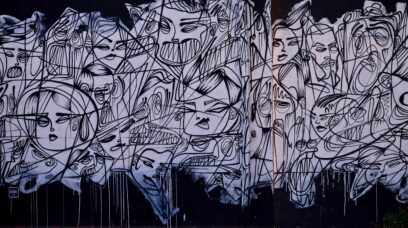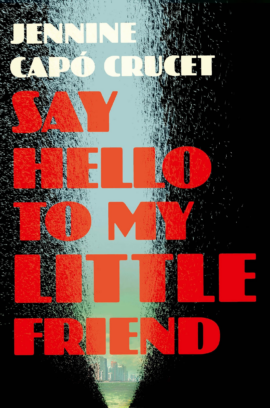You have no items in your cart. Want to get some nice things?
Go shopping
What else.
What else?
Yes, what else.
Well, during the reception, the wedding boat’s DJ knows from experience to play the song Suavemente by Elvis Crespo because if not, the event will be deemed a complete failure of a celebration.
The DJ also knows to play the song La Negra Tiene Tumbao by Celia Cruz because if not, see above.
Yes, good, but what else?
What else? Okay, once the cake’s been cut, no woman on the dance floor should be wearing shoes. Ultimately the reception should feel more like a club than a wedding. Strobe lights, lasers, fog machines if possible, et cetera.
But what about maybe including an actual club, like on South Beach, the Miami people already know. More mentions of palm trees and neon lights. Some Art Deco stuff. Oh, dominoes! Those old Cuban guys at that park playing them! Have them smoking cigars. Bring the cigars back that way.
Dominoes? Art Deco stuff? Is this still just about weddings?
What about more direct nostalgia-laced talk of Cuba. Maybe a nod to the Buena Vista Social Club, since people like seeing things they recognize.
What about a splash or two more of Santeria. People have come to expect that. Seriously: Cigars! Maybe make it so a cigar lector is telling the whole thing to a bunch of poor cigar rollers in a really hot factory a long time ago in Cuba. Make the telling work like smoke.
But it’s Miami. The telling works like water.
Yes! About that: what about Lolita, where did she go.
She never left. She’s trapped in this city. She’s everywhere and nowhere, like a wave crashing.
A scene at the beach! Thongs! More thongs and more butts, excessive and superfluous descriptions of tanned butt-cheeks for sure. Make it sexy!
Speaking of skin: descriptions of a grandmother’s hands and what they smell like (cigar smoke, the sea, etc.). Include some letters from her, have her call everyone m’ijo. Kill her off but have her come back as a ghost and add a whole thread of that ancestor stuff. Set that stuff in Cuba. Sorry, Coo-ba. Make it come down from the mountains (in the form of cigar smoke!). Make it spooky but keep it approachable. Again, think smoke. Lean into the magical realism. Again, ancestor stuff.
Ancestors are not magical realism.
Think too about making it quirkier. Maybe some mermaids. Swamp stuff, you know. This is Florida, after all.
Miami is not Florida.
And actually, what happened to that early promise of baseball players. Actually, Fidel Castro was a pitcher; it’s a pretty well-known fact, actually. Consider actually having a struggling baseball player named Fidel sacrifice a goat or a chicken during some Santeria ritual in the first thirty pages, if possible. Also and actually, consider providing the cultural and historical significance of baseball to all Cubans, just so that’s clear to everyone.
Who counts as everyone?
Just regular old everyone, ha ha! Make it LOUDER. More music, more food smells. More colors—Miami is colorful, describe the colors more. The flooding stuff is depressing. Also, Wynwood! That place is all over everyone’s Miami vacations on social media. Get the Wynwood Walls in here.
Hardly any of those murals are by Miami artists anymore.
Have you read Joan Didion’s book about Miami. She spent several months or weeks down there at some point. Evoke more of Didion’s seedy Miami underbelly.
The preference here has been for Lolita’s underbelly.
People want to see real, devastating pain and experience empathy but while also smelling the ocean, feeling its breeze, hearing its waves crash, etc. They want to escape, but also to really feel like they know the people and the place by the time they finish.
But how can anyone claim to know a place or a community from a single work of art? And when you say people, who exactly do you mean? That’s a hard question to answer!
Is it? Doesn’t seem hard to answer from here.
One possible solution is to add more flavor! Really spice it up!
Think: fiery! Think: Pitbull’s Miami, or maybe the Miami from Miami Vice!
Think: Lolita’s performance, the familiarity of it, how well it works. Think about making a splash by doing the same thing you’ve seen done already, over and over again.
But it’s boring and it’s killing her.
So what if she’s obsessively peeling the paint off the walls between shows. So what if her literal brain is being rewired to have less agency and imagination with every repetitive turn in her tank. Stereotypes exist for a reason!
It’s stereotypies. That’s what those behaviors are called. The word is stereotypy.
Yes! The Spanish so far is great, really lends an authentic taste. Definitely add even more Spanish, but maybe consider italicizing it, for clarity.
Clarity for who? What if it’s already perfectly clear?
It’s whom. And one last note: give people even more. More terror, more violence, more trauma. Open those veins!
What the actual fuck.
Yes! Give even more fucks!
Shut the fuck up because that’s literally impossible right now.
Well, then just more fucks in general. More fucks, more palm trees, more Pitbull, more Scarface. Much, much more Scarface.

Extract from ‘Moby Dick Meets Scarface Satire: SAY HELLO TO MY LITTLE FRIEND’ by Jennine Capó Crucet, published on 5th March 2024.
Jennine Capó Crucet
JENNINE CAPÓ CRUCET is the author of four books, including the novel Make Your Home Among Strangers, which won the International Latino Book Award and was named a New York Times Editors' Choice book, and the multiple award-winning story collection How to Leave Hialeah. Her essay collection My Time Among the Whites: Notes from an Unfinished Education, based on her columns in the New York Times, was longlisted for the PEN Open Book Award. She is a PEN/O. Henry Prize winner, and her writing has appeared on PBS NewsHour, NPR, and in The Atlantic, among other publications. Born and raised in Miami to Cuban parents, she now lives in North Carolina with her family.




